 Petzlover
Petzlover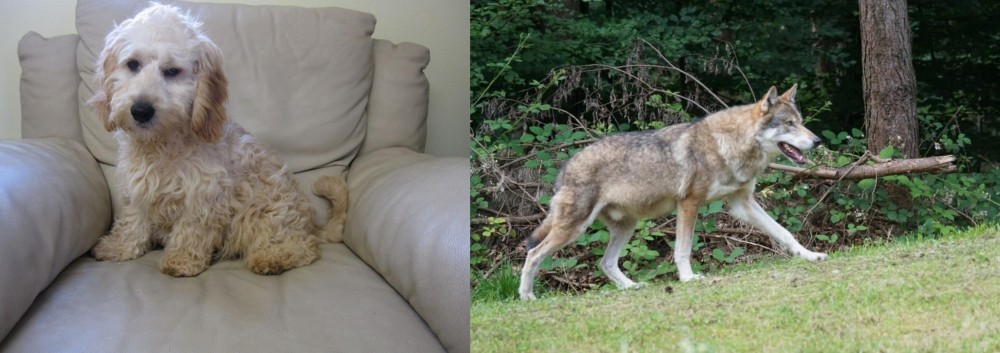 Cockachon is originated from United States but Tamaskan is originated from United Kingdom. Cockachon may grow 32 cm / 12 inches shorter than Tamaskan. Cockachon may weigh 36 kg / 79 pounds lesser than Tamaskan. Both Cockachon and Tamaskan has same life span. Cockachon may have less litter size than Tamaskan. Both Cockachon and Tamaskan requires Low Maintenance.
Cockachon is originated from United States but Tamaskan is originated from United Kingdom. Cockachon may grow 32 cm / 12 inches shorter than Tamaskan. Cockachon may weigh 36 kg / 79 pounds lesser than Tamaskan. Both Cockachon and Tamaskan has same life span. Cockachon may have less litter size than Tamaskan. Both Cockachon and Tamaskan requires Low Maintenance.
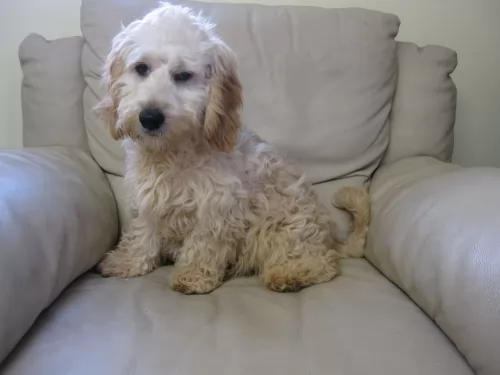 The Cockachon is not a pure bred dog but rather a cross between the Cocker Spaniel and the Bichon Frise. Very little if anything is known about who initially developed the Cockachon. It is known that the International Designer Canine Association (IDCA)registered and recognized the hybrid in 2009.
The Cockachon is not a pure bred dog but rather a cross between the Cocker Spaniel and the Bichon Frise. Very little if anything is known about who initially developed the Cockachon. It is known that the International Designer Canine Association (IDCA)registered and recognized the hybrid in 2009.
It is obviously a relatively new cross breed. The hybrid is also recognized by the American Canine Hybrid Club (ACHC), International Designer Canine Registry (IDCR) and the Designer Dog Kennel Club (DDKC).
 It is believed that the Tamaskan has been specifically bred to resemble a wolf, and he does too.
It is believed that the Tamaskan has been specifically bred to resemble a wolf, and he does too.
They aren’t recognized by the Federation Cynologique Internationale as they aren’t purebred. In fact they aren’t recognized by any kennel club, being crossbred with other dog breeds such as the German Shepherd, Siberian Husky and Alaskan Malamute.
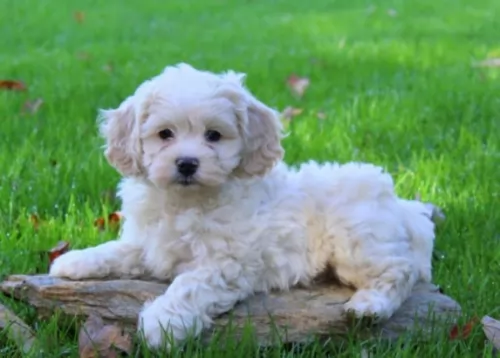 The Cockachon is a cute, little dog very popular in current times. He is small, compact, dark eyes, a round head and black nose. He has a baby face and fluffy hair. It has a furry tail and a blunt muzzle.
The Cockachon is a cute, little dog very popular in current times. He is small, compact, dark eyes, a round head and black nose. He has a baby face and fluffy hair. It has a furry tail and a blunt muzzle.
The Cockachon is a mix between the American Cocker Spaniel and the Bichon Frise. In order to get a better idea of what the hybrid can look like just look at the individual parents. The American Cocker Spaniel is a small dog with a short muzzle and domed head. It is in the Sporting Group, but it is the smallest member of the group. He has a compact, sturdy body and though domed his head is refined.
The Cocker’s stance includes a sloping topline, muscular hindquarters and strong shorter legs adds up to a balanced canine. The coat can be in a wide variety of colors including liver, golden, black, and red. Also, it could be liver and tan, black and tan, roan or tricolors. So, while the Bichon Frise is always white the Cockachon can be any of these colors including white. The types of coats that the Cocker Spaniel and the Bichon Frise have are very different as well.
The Bichon Frise is also a small dog, actually smaller than the American Cocker. The Cockachon usually ends up being about the size of the Bichon at 5-10 kg in weight and 23-30 cm in height. The skull of the Bichon Frise is round rather than domed and the muzzle is also rounded. The tail is long and curly while the Cocker would usually have a cropped tail. The nose and eyes of the Bichon Frise are black and its hair is dense and curly. Unlike the Cocker Spaniel it barely sheds.
Many Cockachon have floppy ears, curly coats and come in any variety of colors though many, many are white.
 The beautiful Tamaskan dog is large, standing at between 61 and 71cm in height and weighing between 23 and 45 kg.
The beautiful Tamaskan dog is large, standing at between 61 and 71cm in height and weighing between 23 and 45 kg.
It is a mix between several sled dogs – Siberian Husky and Alaskan Malamute. The thick double coat is coarse and can be grey, cream, black or reddish and the tail of the Tamaskan is wolf-like too – thick and bushy.
His ears are erect and alert and he has sharp hearing. His almond shaped eyes can be yellow or brown and they are alert and bright and don’t miss a thing.
The Tamaskan is capable of becoming a good family pet, being gentle with children and accepting of other dogs. His high intelligence makes it that he can learn a lot of simple commands.
Because he has been a pack dog, he doesn’t like to be left alone. He is social and as a pet he will want to be an interactive part of his human family. Leaving him unsupervised for days on end will see him getting up to mischief.
He will die of depression, boredom and loneliness if he is put into the back yard and ignored.
They are certainly not recommended for life in the city but will need to have a large space to run and play.
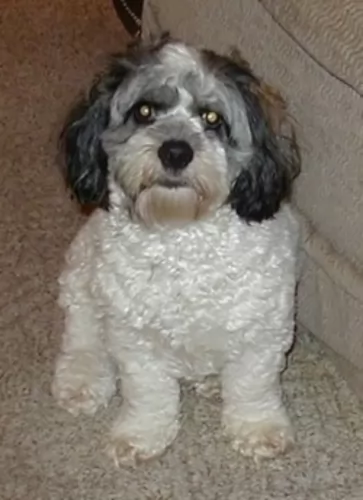 People created the Cockachon to get a small, lap or carry dog that had certain characteristics. These characteristics included a very social, loving dog. He is active and friendly, sweet and gentle. He is loyal, and loves being loved. He is great with other dogs and you can trust him with your children. He is a little independent but very loyal.
People created the Cockachon to get a small, lap or carry dog that had certain characteristics. These characteristics included a very social, loving dog. He is active and friendly, sweet and gentle. He is loyal, and loves being loved. He is great with other dogs and you can trust him with your children. He is a little independent but very loyal.
Like many little dogs he can have serious separation anxiety. Crate training is recommended so that he has a place to feel safe when you are not with him.
 The Tamaskan may look like a wolf but he isn’t aggressive. He’s looks can be to your advantage because intruders think twice before confronting a ‘wolf’.
The Tamaskan may look like a wolf but he isn’t aggressive. He’s looks can be to your advantage because intruders think twice before confronting a ‘wolf’.
Little do they know that this is a loving, loyal dog that makes an excellent playmate for children. They’re social too and want to be with their family a lot of the time.
They’re dogs so devoted to their human family that they can even suffer with separation anxiety.
Give him the love and exercise he craves and you’ll find in him the most awesome canine friend.
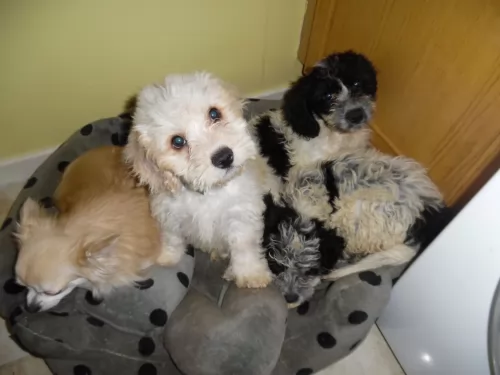 Hybrid dogs seldom have a lot of inherited diseases as they seem to jump a generation but if they do, it can be either a combination of both breeds issues or issues from just one of the breeds in the cross. For the Cockachon these issues include:
Hybrid dogs seldom have a lot of inherited diseases as they seem to jump a generation but if they do, it can be either a combination of both breeds issues or issues from just one of the breeds in the cross. For the Cockachon these issues include:
This loose kneecap issue is common to many small dogs and can cause lameness if not addressed.
Eyelid problems such as the ones that might bother a Cockachon can be found in many small dogs. These include Entropion and Ectropion.
 Your healthy Tamaskan, even though he isn’t prone to common genetic health problems, can get any one of the many dog illnesses there are, although this is highly unlikely.
Your healthy Tamaskan, even though he isn’t prone to common genetic health problems, can get any one of the many dog illnesses there are, although this is highly unlikely.
However without good food, exercise, love and care, he can also be susceptible to parasites, rabies, parvovirus, hip dysplasia, bloat, skin infections and cancer.
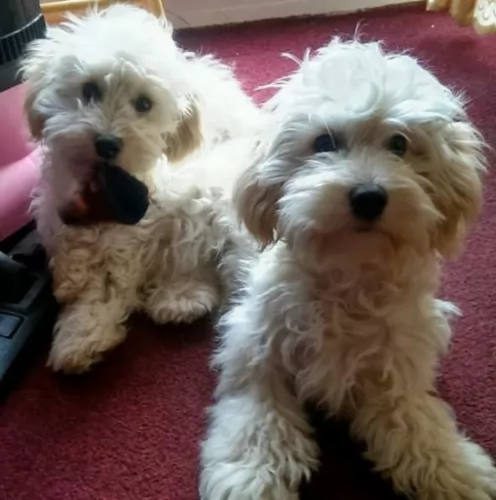 Don’t overfeed a Cockachon. Give him ¾ -1.5 cups of dry food of high quality in two meals per day.
Don’t overfeed a Cockachon. Give him ¾ -1.5 cups of dry food of high quality in two meals per day.
In addition to the issues listed above, the Cockachon is also prone to heart disease and cardiac issues.
The Cockachon has a lot of energy for its size. Make sure it gets plenty of exercise. If walks are the exercise of your choice make sure you walk him for 30 minutes a day. He loves to play, and a back yard would be nice. These little guys do well in obedience but are usually to small for agility.
 The Tamaskan Dog is very active. He just loves activity - long walks and hikes and lots of running off a leash. He’ll love ball games too – anything that keeps him mentally and physically active.
The Tamaskan Dog is very active. He just loves activity - long walks and hikes and lots of running off a leash. He’ll love ball games too – anything that keeps him mentally and physically active.
Provide your beautiful, active Tamaskan dog with top quality food that is rich in protein. You can give him one of the quality commercially manufactured foods – just check out the ingredients on the packaging and go for the dog foods with wholesome, natural ingredients in them.
Your Tamaskan is part of the family and deserves some home-made food. Nothing spicey and exotic as you’ll sit with stomach problems. Boiled chicken, brown rice or pasta and spinach, sweet potatoes and carrots are a super healthy choice and food like this won’t play havoc with your dog’s digestion.
This food can all be chopped up and small portions added into the dry kibble twice a week.
●This is a fairly low maintenance dog. He does shed so a good brush twice a week will be sufficient for him.
●When you brush him, check him over for unusual lumps. Look inside his eyes and inside his mouth as he can’t tell you about a bad tooth that could be causing him pain. Check inside his ears too for signs of redness. If you don’t want to do these things, at least send him to a professional groomer who will do it all for you.
●Have your pet neutered or spayed if you want to avoid puppies. This can be beneficial for your pet’s health too.